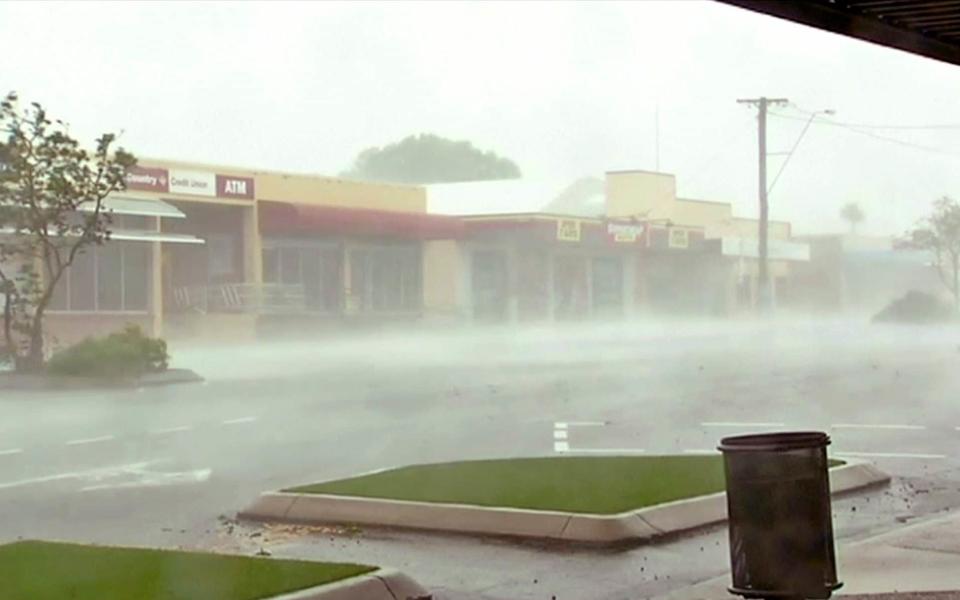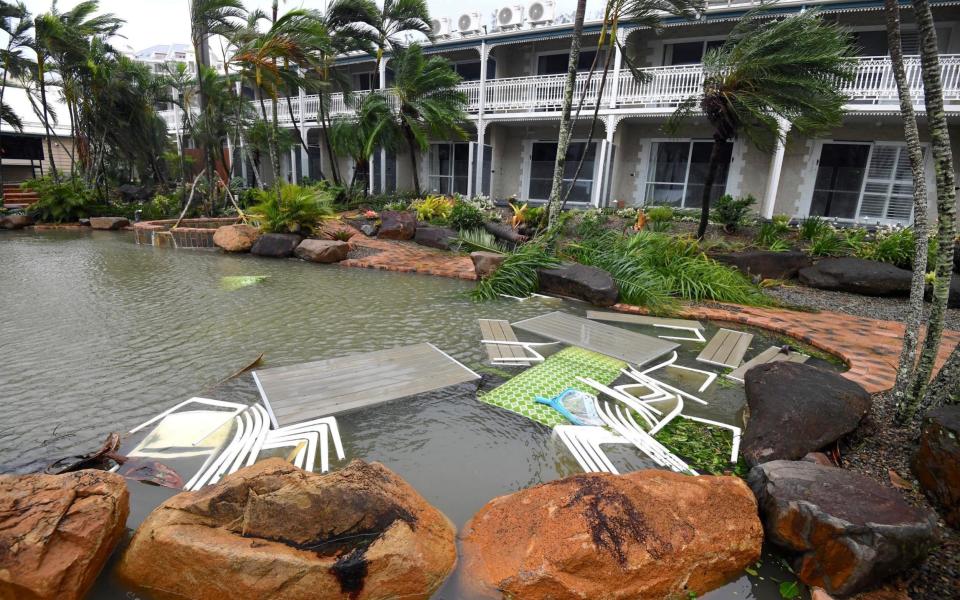Thousands take shelter as Cyclone Debbie lashes Australian coastal resorts

Australia’s military has been deployed to the north-east coast following a “catastrophic” tropical cyclone which ripped buildings apart and tore down trees as it hit towns and holiday resorts with wind speeds of 160 miles an hour.
The category 4 cyclone – named Debbie – left townships across the state of Queensland deserted as residents evacuated and those remaining were warned to “not go outside”.
About 60,000 coastal and island homes were left without power.
A resident in the town of Proserpine, who huddled with her husband in their bathroom, described her horror as the cyclone tore off their neighbour’s roof and sent a stream of tiles flying at their house.

“The next-door neighbour's roof has been flying off for hours and it's smashed into our side windows — we've got three broken windows now so the rooms are totalled," the woman, named Sue, told ABC News.
“I'm in the safest place, but that doesn't mean I'm safe. I'm in a very small bathroom and you can just hear these other crashing noises and the doors shaking… It's really horrible.”

The cyclone tore through resorts on Hamilton Island and several Whitsunday islands – all popular destinations for viewing the Great Barrier Reef – before crossing the coast at about midday, local time, between the towns of Bowen and Airlie Beach.
Authorities are still trying to assess the damage and search for any casualties but have been hampered by the strong winds left in the cyclone’s wake.
#CycloneDebbie beginning to make landfall on the mainland between Bowen and Airlie Beach https://t.co/mDp5lxJyJ5pic.twitter.com/GpdZZiRh9o
— QPS Media Unit (@QPSmedia) 28 March 2017
"Tomorrow [Wednesday] we’ll see lots of structural damage,” said Ian Stewart, Queensland’s Police Commissioner.
“I’m just hoping we don’t see loss of life. The loss of power, the loss of phone connectivity means that there could be people right now who are in difficult and dangerous and tragic situations — we just don’t know about it.”
Hamilton Island has recorded a wind gust of 262km/h. #CycloneDebbie
— QPS Media Unit (@QPSmedia) 28 March 2017
Mike Brunker, a Bowen resident and councillor in the Whitsunday region, said the winds were “terrifying” and caused his house to violently shake. “My back fence is laying in the neighbour’s yard,” he said.
Despite the strong gusts in and around the eye of the cyclone, it moved relatively slowly – at a pace of about two to six miles an hour.
The bedraggled face of Queensland this morning.. Pic from @abcnews#cyclonedebbie#naturesurvivingpic.twitter.com/JPcSqqqeur
— Ann Tonge (@anntonge6) March 28, 2017
���� Incredible during #CycloneDebbie photo and one before on #HamiltonIsland by Daniel McMahon. @ABCemergency@abcnewspic.twitter.com/wwOUuBKURy
— Lawrence Champness (@champy) 27 March 2017
The sluggish pace means that it is likely to continue to wreak havoc across the region for about five days, slowing down the recovery effort.
In the town of Proserpine, 8.3 inches of rain fell in an hour – labelled a “once in a century” event.
The Australian Defence Force has deployed soldiers and aircraft to assist with the emergency relief and any recoveries.
The only known injury was a man injured when a wall collapsed on him in Proserpine.
Authorities have warned there could still be severe flash flooding.

Schools were closed, transport services suspended and flights disrupted.
The Insurance Council of Australia said the cyclone was a “catastrophe” and was believed to have caused widespread damage across the region.
Annastacia Palaszczuk, the state premier, told ABC News: "Everyone is going to be in shock tomorrow, just to see the full impact of this cyclone. I'm bracing myself for it."
The horrific winds did not stop a man surfing during the cyclone. He was widely branded an “idiot” on social media.
In brief | How tropical cyclones are ranked

 Yahoo News
Yahoo News 
